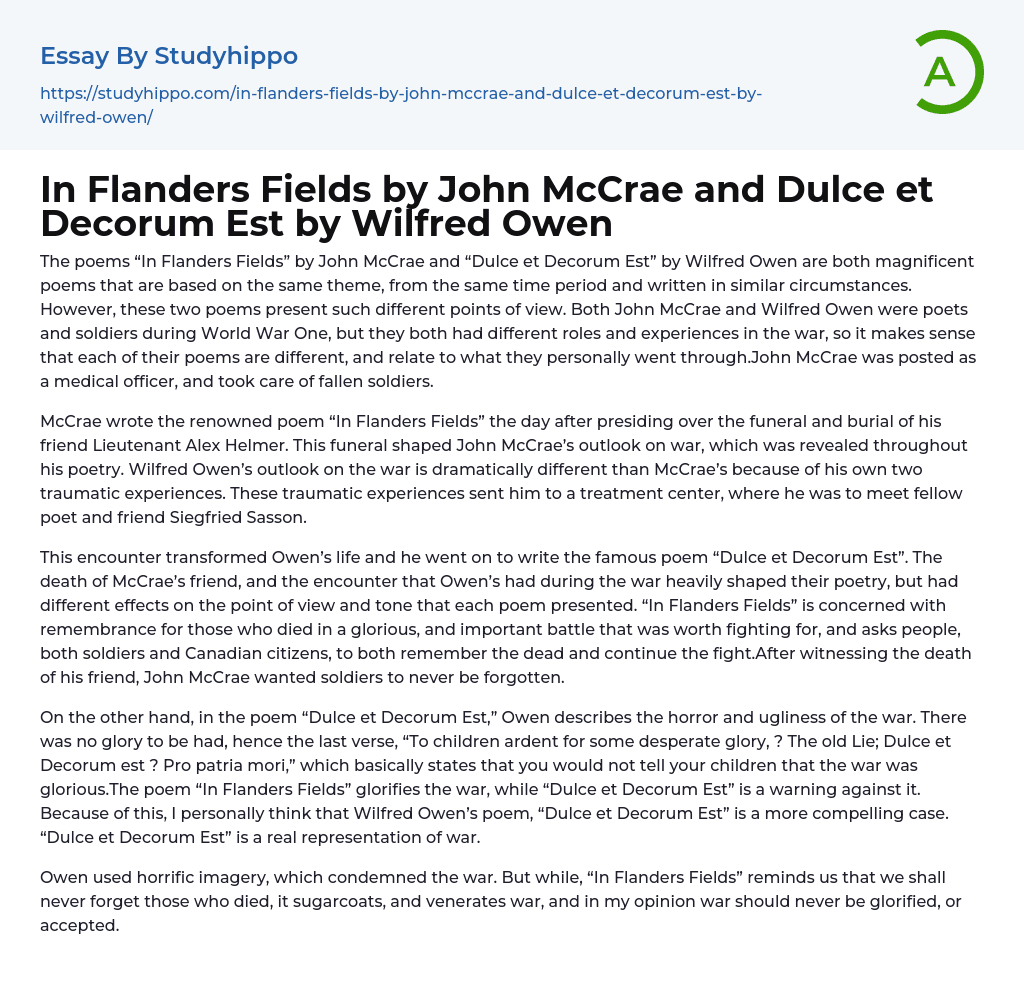

In Flanders Fields by John McCrae and Dulce et Decorum Est by Wilfred Owen Essay Example
The poems “In Flanders Fields” by John McCrae and “Dulce et Decorum Est” by Wilfred Owen are both magnificent poems that are based on the same theme, from the same time period and written in similar circumstances. However, these two poems present such different points of view. Both John McCrae and Wilfred Owen were poets and soldiers during World War One, but they both had different roles and experiences in the war, so it makes sense that each of their poems are different, and relate to what they personally went through.John McCrae was posted as a medical officer, and took care of fallen soldiers.
McCrae wrote the renowned poem “In Flanders Fields” the day after presiding over the funeral and burial of his friend Lieutenant Alex Helmer. This funeral shaped John McCrae’s outlook on war, which was revealed throughout hi
...s poetry. Wilfred Owen’s outlook on the war is dramatically different than McCrae’s because of his own two traumatic experiences. These traumatic experiences sent him to a treatment center, where he was to meet fellow poet and friend Siegfried Sasson.
This encounter transformed Owen’s life and he went on to write the famous poem “Dulce et Decorum Est”. The death of McCrae’s friend, and the encounter that Owen’s had during the war heavily shaped their poetry, but had different effects on the point of view and tone that each poem presented. “In Flanders Fields” is concerned with remembrance for those who died in a glorious, and important battle that was worth fighting for, and asks people, both soldiers and Canadian citizens, to both remember the dead and continue the fight.After witnessing the death of his friend, John
McCrae wanted soldiers to never be forgotten.
On the other hand, in the poem “Dulce et Decorum Est,” Owen describes the horror and ugliness of the war. There was no glory to be had, hence the last verse, “To children ardent for some desperate glory, ? The old Lie; Dulce et Decorum est ? Pro patria mori,” which basically states that you would not tell your children that the war was glorious.The poem “In Flanders Fields” glorifies the war, while “Dulce et Decorum Est” is a warning against it. Because of this, I personally think that Wilfred Owen’s poem, “Dulce et Decorum Est” is a more compelling case. “Dulce et Decorum Est” is a real representation of war.
Owen used horrific imagery, which condemned the war. But while, “In Flanders Fields” reminds us that we shall never forget those who died, it sugarcoats, and venerates war, and in my opinion war should never be glorified, or accepted.
- Book Summary essays
- Metaphor essays
- Reader essays
- Rhyme essays
- Literary devices essays
- Villain essays
- Books essays
- Genre essays
- Literary Criticism essays
- Writer essays
- Protagonist essays
- Simile essays
- Poem essays
- Book Report essays
- Book Review essays
- Greek Mythology essays
- Plot essays
- Tragic Hero essays
- Coming of Age essays
- Play essays
- Rhetoric essays
- Rhetorical Question essays
- Translation essays
- Understanding essays
- Reason essays
- Character essays
- Letter essays
- American Literature essays
- Literature Review essays
- Utopia essays
- Poetry Analysis essays
- Dante's Inferno essays
- Between The World and Me essays
- Incidents in The Life of a Slave Girl essays
- Flowers for Algernon essays
- Myth essays
- Everyday Use essays
- Boo Radley essays
- Genesis essays
- Richard iii essays
- Alice in Wonderland essays
- On the road essays
- Ozymandias essays
- The Nightingale essays
- Holden Caulfield essays
- Animal Farm essays
- 1984 essays
- A Hanging essays
- Shooting An Elephant essays
- A Tale Of Two Cities essays



